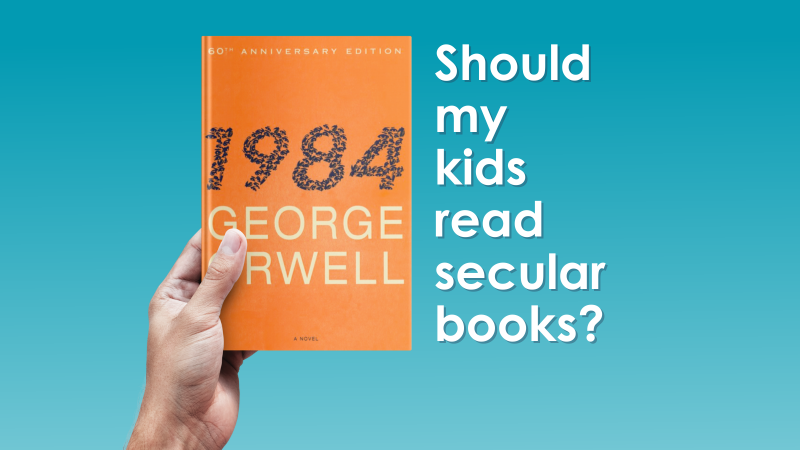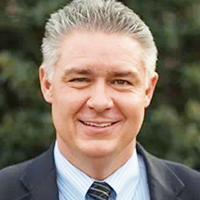You Read What? The Case for Christians Reading Secular Books

Every so often, I figure out how to offend a family before they even join the school. One of my favorite “tactics” for being offensive is to show them our reading list. As they read the list, they gasp, furrow their brow, or simply exclaim, “You read (fill in the blank)?” Sometimes it is Orwell’s 1984; other times it’s Nietzsche’s Beyond Good and Evil. During Covid, all of the families were getting books off of my front porch. I remember that Camus’s The Stranger was sitting next to Misty of Chincoteague. One was for 3rd graders and the other for 12th graders. I wondered if these two books had ever been together before. The sincere question that follows this gasp deserves an answer: Why should Christians read secular books?
There are three good reasons why Christians should read secular books.
First, we should read secular books because we need to know what our enemies are thinking. Now, of course, not every unbeliever feels like an enemy. Some of them might be friends of ours. While this is true, there is still a great battle going on. If we want to be true to Christ, we can’t avoid this battle. It is a spiritual battle. Also, most of the time we are reading the kind of secular books that I am recommending in the section, we are talking about books that are written by open enemies of Christ. These books can cause great harm to people.
One of the greatest soldiers in American history was named Dick Winters. He was part of the 101st Airborne’s Easy Company. Don’t be fooled. Easy did not have it easy. He parachuted behind enemy lines on D-Day and fought all the way across Europe. His company was the one that first took the “Eagle’s Nest”, Hitler’s mountaintop retreat. (I am partial to Winters because he is from the county where I live and is buried a few miles from my home.) Stephen Ambrose, the great historian, made Winters the central character in his famous book Band of Brothers. On D-Day, Winters started to demonstrate his ability. He and his men took an enemy position whose guns were aimed to take out the Marines invading at Utah beach. Winters not only knew his orders and how to control his troops. He knew his enemy as well and this knowledge saved countless lives.
Recently, Carl Trueman, a Christian professor at Grove City College, has written two important books. The first one is called The Rise and Triumph of the Modern Self. The second is called Strange New World. You should read one of them. The content is the same. Rise and Triumph of the Modern Self is a scholarly book; Strange New World Is more accessible, shorter, and easier to read. Both detail how we have become a culture where people think that what they think or feel determines reality. Dr. Trueman goes all the way back to the Enlightenment and traces the thoughts of people like Rousseau, Nietzsche, Marx, and Simone de Beauvoir. Some of the books that he had to read to write his books contain ideas that currently are harming many people. Thank God, Dr. Truemen reads secular books.
Second, we should read secular books because we need to know what unbelievers are thinking so that we can help them find the truth, peace, and Christ. We read the first sort of books to avoid and help others avoid really bad ideas. We read the second sort of secular book to know what is going on in the culture around us. When we talk with people, we need common starting points and we need to understand their thoughts. It is also important to read books that can help you understand what is going on in the world of science, economics, politics, and philosophy. Some of these books might be written from a Christian perspective, but some might be written by unbelievers. The ideas in them are going to be important as you have conversations and minister to your neighbors or those in need.
This happens with books that are really popular or really excellent. I am always hunting for books like these. One example of this sort of book would be The Book of Eels by Patrik Svensson. It is one of the most interesting books I have read in the last few years. In it, we find the history and wonder of eels. Did you know that every eel is born in the Sargasso’s Sea? Each newborn eel floats and swims back to the place of its origin. We don’t know how they know to do this. Eels live in this place for up to 80 years—some live over 100 years. Also, for most of their lives, eels have no sexual characteristics. Some of the ancients believed that eels reproduced asexually. Amazingly, eels know when they need to begin the trek back to the Sargasso Sea where they mate and die. Now, the author of this amazing book is not a believer. This book, however, has given me so many good conversation starters so that I can share this and then talk with people about the wonder of creation. Emily, my wife, is starting to get tired of it. “Don’t get him talking about eels,” she says to guests.
Finally, we should read secular books because there is much wisdom contained in them. God is good; so good that He gives great gifts even to those who fail to acknowledge Him and even to those who hate Him. This truth belongs to God, but He graciously helps those without faith to see true things and tell great stories. We can see this in the classical world with people like Plato, Aristotle, Euclid, and Homer. Wonderful wisdom and beauty are contained in their books. Not all unbelieving wisdom is ancient. I am a big fan of Michael Lewis’s books. Lewis is at least an agnostic, but he is a great storyteller (be forewarned that there is a lot of cursing in some of his best books). My favorite Michael Lewis book is The Big Short. It is about the financial crisis called “The Great Recession” that happened when housing prices had a downturn in 2007. Lewis’s book details how the financial world fell into a trap by looking at a handful of people who saw the truth and made gigantic profits because of their insights. I love the book because it helped me understand this important event that impacted my life and because Lewis is such a great storyteller.
Of course, some might say, “But why not just read the Bible? Won’t it give us everything we need?” Before I disagree with this, let me defend this perspective a little. If your reading needs could be translated into something like the food pyramid, the Bible should be the bottom-most foundational part of the pyramid. Read the Bible more than any other book. I spend about 30 minutes reading the Bible each day. Over 35 – 40 years, that is a lot of reading. I am amazed daily by the glory of God’s Word. It is new every morning. Still, it would be unbiblical to read only the Bible if that was not what the Bible expected or told you to do. The expectations of the Bible seem clear: God wants you to read carefully, wisely, and voraciously. Paul at Mars Hill was able to quote the Greek poet Aratus from memory. That means he had probably read him many times. Deuteronomy 29:29 tells us that all that God has revealed is for us to know. So, read the Bible more than any other book, but don’t read it exclusively—because that is not what the Bible itself recommends.
Secular books are valuable and Christians should value them. They help us to understand the plans of our enemies, they help us have common wisdom and common knowledge to relate to those believers and unbelievers around us, and they contain wisdom and truth given to these writers by God that we should reclaim.







